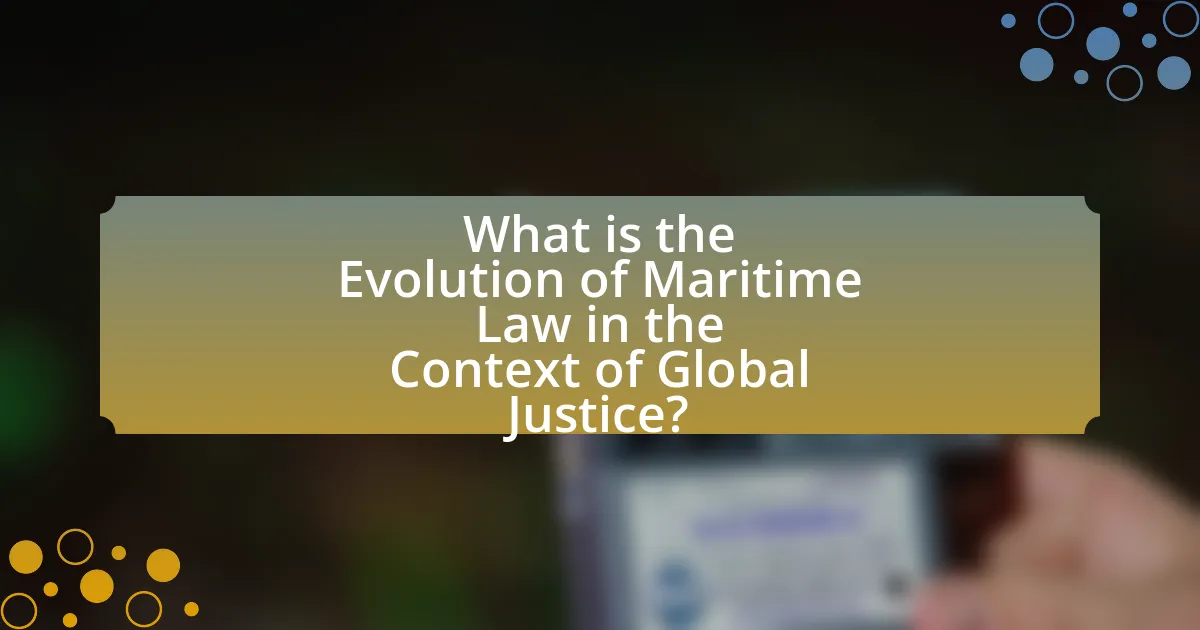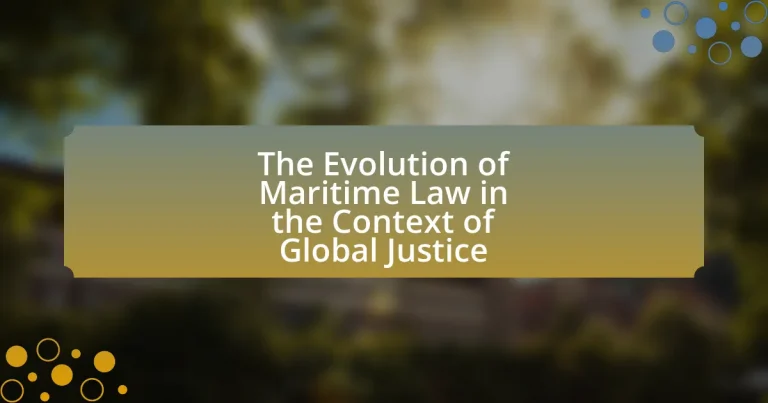The article examines the evolution of maritime law within the framework of global justice, highlighting the transition from traditional state-centric regulations to a more inclusive approach that addresses human rights, environmental protection, and equitable resource distribution. It discusses the historical development of maritime law, influenced by key treaties such as the United Nations Convention on the Law of the Sea (UNCLOS), and the impact of international agreements on safety and environmental standards. The article also explores the importance of global justice in maritime contexts, addressing issues like piracy, human trafficking, and climate change, while emphasizing the role of international cooperation and technological advancements in shaping future maritime legal frameworks.

What is the Evolution of Maritime Law in the Context of Global Justice?
The evolution of maritime law in the context of global justice reflects the transition from traditional, state-centric regulations to a more comprehensive framework that addresses human rights, environmental protection, and equitable resource distribution. Historically, maritime law was primarily concerned with trade and navigation, governed by customs and treaties among nations, such as the United Nations Convention on the Law of the Sea (UNCLOS) established in 1982, which aimed to balance the rights of coastal states with the freedoms of navigation.
In recent decades, the focus has shifted towards incorporating principles of global justice, emphasizing the protection of vulnerable populations, such as migrant workers and refugees at sea, and addressing environmental concerns related to maritime activities. This shift is evidenced by international agreements like the International Maritime Organization’s (IMO) conventions on ship safety and pollution prevention, which reflect a growing recognition of the need for sustainable practices in maritime operations.
Furthermore, the rise of non-state actors and international organizations has influenced maritime law, promoting accountability and transparency in maritime governance. This evolution signifies a broader understanding of justice that transcends national borders, aiming for a more equitable and sustainable use of ocean resources.
How has maritime law developed over time?
Maritime law has developed over time through a combination of customary practices, national legislation, and international treaties. Initially rooted in ancient codes, such as the Rhodian Sea Law, maritime law evolved significantly during the Middle Ages with the establishment of the Consolato del Mare, which provided a framework for maritime commerce in the Mediterranean. The 19th century saw the emergence of formalized international conventions, such as the Hague Rules of 1924, which standardized shipping practices and liability. The development continued with the United Nations Convention on the Law of the Sea in 1982, which established comprehensive guidelines for the use of the world’s oceans, balancing the interests of coastal states and international navigation. This evolution reflects the growing complexity of global trade and the need for a cohesive legal framework to address issues such as piracy, environmental protection, and maritime boundaries.
What historical events have influenced maritime law?
The development of maritime law has been significantly influenced by several historical events, including the Code of Hammurabi, the Roman Empire’s maritime regulations, and the establishment of the Law of the Sea. The Code of Hammurabi, dating back to 1754 BC, included provisions for maritime trade, establishing early principles of liability and contracts. Roman maritime law, particularly through the Lex Rhodia de iactu, introduced concepts of shipowner liability and cargo claims, shaping modern legal frameworks. Additionally, the United Nations Convention on the Law of the Sea, adopted in 1982, codified international maritime law, addressing issues such as territorial waters and navigation rights, further influencing global maritime governance. These events collectively laid the foundation for contemporary maritime law, reflecting the evolution of legal principles in response to changing maritime practices and international relations.
How have international treaties shaped maritime law?
International treaties have significantly shaped maritime law by establishing standardized regulations and frameworks for navigation, safety, and environmental protection on the seas. For instance, the United Nations Convention on the Law of the Sea (UNCLOS), adopted in 1982, provides comprehensive guidelines governing maritime boundaries, resource management, and the rights of coastal states, thereby influencing national laws and international relations. Additionally, treaties like the International Convention for the Safety of Life at Sea (SOLAS) and the International Convention on Maritime Search and Rescue (SAR) have set safety standards that enhance maritime security and protect human life at sea. These treaties collectively contribute to a cohesive legal structure that promotes cooperation among nations and addresses global maritime challenges.
Why is global justice important in maritime law?
Global justice is important in maritime law because it ensures equitable access to maritime resources and protection of human rights at sea. This principle addresses issues such as piracy, illegal fishing, and environmental degradation, which disproportionately affect vulnerable populations. For instance, the United Nations Convention on the Law of the Sea (UNCLOS) establishes guidelines that promote fair resource distribution and environmental stewardship, thereby reinforcing global justice in maritime contexts. By fostering cooperation among nations, global justice in maritime law helps to create a more stable and secure maritime environment, ultimately benefiting all stakeholders involved.
What role does maritime law play in promoting global justice?
Maritime law plays a crucial role in promoting global justice by establishing a legal framework that governs the rights and responsibilities of nations and individuals at sea. This body of law, including treaties like the United Nations Convention on the Law of the Sea (UNCLOS), facilitates the resolution of disputes over maritime boundaries, resource exploitation, and environmental protection, thereby ensuring equitable access to ocean resources. For instance, UNCLOS provides guidelines for the sustainable use of marine resources, which helps prevent conflicts and promotes cooperation among states. Additionally, maritime law addresses issues such as piracy and human trafficking, enabling international collaboration to uphold human rights and maintain security on the high seas.
How does maritime law address issues of inequality and injustice?
Maritime law addresses issues of inequality and injustice primarily through the establishment of regulations that protect the rights of seafarers and ensure equitable treatment in maritime operations. These regulations include provisions for fair wages, safe working conditions, and the right to seek legal recourse in cases of exploitation or abuse. For instance, the Maritime Labour Convention (MLC) 2006 sets minimum standards for working and living conditions for seafarers, aiming to eliminate discrimination and promote social justice within the maritime industry. Additionally, international treaties and conventions, such as the United Nations Convention on the Law of the Sea (UNCLOS), provide frameworks for resolving disputes and protecting the rights of coastal states, thereby addressing power imbalances and promoting equitable access to maritime resources.
What are the key principles of maritime law related to global justice?
The key principles of maritime law related to global justice include the protection of human rights at sea, the enforcement of environmental regulations, and the promotion of equitable access to maritime resources. These principles ensure that all individuals, regardless of nationality, are treated fairly and justly in maritime contexts, reflecting the broader goals of global justice. For instance, the United Nations Convention on the Law of the Sea (UNCLOS) establishes guidelines for the use of ocean resources while emphasizing the importance of protecting the marine environment and the rights of coastal states. Additionally, international treaties address issues such as piracy and human trafficking, reinforcing the commitment to uphold justice on the high seas.
What are the fundamental rights protected under maritime law?
The fundamental rights protected under maritime law include the right to safe passage, the right to fair treatment, and the right to compensation for injuries or losses at sea. These rights are established through various international conventions, such as the United Nations Convention on the Law of the Sea (UNCLOS), which outlines the legal framework for maritime activities and ensures that seafarers are treated justly and humanely. Additionally, the Maritime Labour Convention (MLC) 2006 reinforces the rights of seafarers, mandating decent working and living conditions on board ships. These legal instruments collectively affirm the protection of individual rights within the maritime context, promoting justice and equity on the high seas.
How do these principles apply to contemporary maritime issues?
The principles of maritime law apply to contemporary maritime issues by providing a framework for resolving disputes, ensuring safety, and promoting environmental protection. These principles, such as the United Nations Convention on the Law of the Sea (UNCLOS), establish guidelines for territorial waters, navigation rights, and the responsibilities of states regarding marine resources. For instance, UNCLOS has been instrumental in addressing issues like piracy, illegal fishing, and maritime boundary disputes, which are prevalent in today’s global maritime landscape. Furthermore, the principle of environmental stewardship within maritime law is increasingly relevant as nations confront challenges related to climate change and marine pollution, emphasizing the need for sustainable practices in shipping and resource extraction.
How does the evolution of maritime law impact global justice today?
The evolution of maritime law significantly impacts global justice today by establishing frameworks that govern international trade, environmental protection, and human rights at sea. Modern maritime law, shaped by treaties such as the United Nations Convention on the Law of the Sea (UNCLOS), provides legal standards that promote equitable access to maritime resources and protect the rights of seafarers. For instance, UNCLOS outlines the rights of coastal states and the responsibilities of nations to prevent marine pollution, thereby fostering accountability and cooperation among countries. This legal evolution helps address issues like illegal fishing and human trafficking, contributing to a more just and sustainable global maritime environment.
What challenges does maritime law face in the context of global justice?
Maritime law faces significant challenges in the context of global justice, primarily due to jurisdictional disputes, enforcement issues, and the complexities of international treaties. Jurisdictional disputes arise when multiple countries claim authority over the same maritime areas, complicating legal proceedings and accountability. Enforcement issues stem from the difficulty in monitoring and regulating activities on the high seas, where national laws often lack reach. Additionally, the complexities of international treaties, such as the United Nations Convention on the Law of the Sea, create challenges in harmonizing laws across different nations, leading to inconsistencies in legal interpretations and applications. These factors collectively hinder the effective administration of justice in maritime contexts.
How do piracy and human trafficking affect maritime law enforcement?
Piracy and human trafficking significantly complicate maritime law enforcement by increasing operational challenges and resource demands. Law enforcement agencies must allocate more resources to combat these crimes, which often occur in high-risk areas, such as the Gulf of Aden and the Mediterranean Sea. For instance, the International Maritime Organization reported that piracy incidents in the Gulf of Aden led to increased naval patrols and international cooperation, straining the capabilities of maritime law enforcement agencies. Additionally, human trafficking networks exploit maritime routes, requiring law enforcement to develop specialized training and intelligence-sharing mechanisms to effectively address these crimes. The United Nations Office on Drugs and Crime highlighted that human trafficking at sea often involves complex logistics, necessitating enhanced surveillance and legal frameworks to prosecute offenders. Thus, piracy and human trafficking create a multifaceted challenge for maritime law enforcement, demanding a coordinated global response.
What are the implications of climate change for maritime law and justice?
Climate change significantly impacts maritime law and justice by necessitating adaptations in legal frameworks to address rising sea levels, increased frequency of extreme weather events, and shifting marine ecosystems. These changes lead to challenges in jurisdiction over maritime boundaries, as coastal states may experience loss of territory, prompting disputes over maritime zones. Additionally, climate change exacerbates issues related to marine resource management, requiring updated regulations to ensure sustainable practices and equitable access to resources. The International Maritime Organization has recognized the need for enhanced legal measures to mitigate greenhouse gas emissions from shipping, reflecting a shift towards accountability in maritime operations. Furthermore, the displacement of communities due to climate-related events raises questions about the rights of affected populations and their access to justice, highlighting the intersection of environmental justice and maritime law.
What future trends can we expect in maritime law and global justice?
Future trends in maritime law and global justice will likely focus on increased regulation of environmental protection, enhanced enforcement of human rights at sea, and the integration of technology in monitoring maritime activities. The International Maritime Organization has been pushing for stricter regulations on emissions and pollution, reflecting a global shift towards sustainability. Additionally, the rise of human trafficking and illegal fishing has prompted international legal frameworks to prioritize human rights, as seen in recent treaties aimed at protecting vulnerable populations. The adoption of advanced technologies, such as satellite surveillance and blockchain for tracking shipping activities, will further improve compliance and transparency in maritime operations. These trends indicate a comprehensive approach to addressing both environmental and social justice issues within the maritime sector.
How might technological advancements influence maritime law?
Technological advancements will significantly influence maritime law by necessitating updates to regulations governing navigation, safety, and environmental protection. For instance, the rise of autonomous vessels requires legal frameworks to address liability and operational standards, as traditional laws may not adequately cover scenarios involving unmanned ships. Additionally, advancements in satellite tracking and monitoring technologies enhance compliance with international regulations, such as the International Maritime Organization’s conventions, by providing real-time data on vessel movements and emissions. This shift towards data-driven enforcement can lead to more effective governance of maritime activities, ensuring adherence to environmental standards and safety protocols.
What role will international cooperation play in the evolution of maritime law?
International cooperation will be essential in the evolution of maritime law as it facilitates the harmonization of regulations across different jurisdictions. This collaboration is crucial for addressing transnational issues such as piracy, environmental protection, and maritime safety, which cannot be effectively managed by individual nations alone. For instance, the United Nations Convention on the Law of the Sea (UNCLOS) exemplifies how international agreements can establish a framework for cooperation, enabling countries to work together on maritime disputes and resource management. Furthermore, joint initiatives, such as the Global Ocean Commission, demonstrate the collective effort needed to tackle challenges like overfishing and marine pollution, reinforcing the importance of cooperative frameworks in shaping future maritime legal standards.
What best practices can be adopted to enhance maritime law in the context of global justice?
To enhance maritime law in the context of global justice, best practices include the establishment of international cooperation frameworks, the implementation of comprehensive regulatory standards, and the promotion of transparency in maritime operations. International cooperation frameworks, such as the United Nations Convention on the Law of the Sea (UNCLOS), facilitate collaboration among nations to address issues like piracy, illegal fishing, and environmental protection. Comprehensive regulatory standards, including safety protocols and environmental regulations, ensure that maritime activities are conducted responsibly, reducing harm to marine ecosystems and promoting fair practices. Transparency in maritime operations, achieved through initiatives like the Automatic Identification System (AIS), allows for better monitoring of vessel movements, thereby deterring illegal activities and enhancing accountability. These practices collectively contribute to a more just and equitable maritime environment, aligning with global justice principles.


